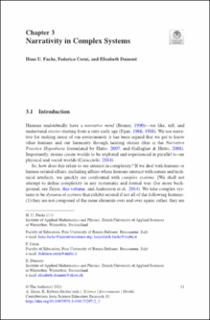Please use this identifier to cite or link to this item:
https://doi.org/10.21256/zhaw-22624Full metadata record
| DC Field | Value | Language |
|---|---|---|
| dc.contributor.author | Fuchs, Hans U. | - |
| dc.contributor.author | Corni, Federico | - |
| dc.contributor.author | Dumont, Elisabeth | - |
| dc.date.accessioned | 2021-06-11T12:58:46Z | - |
| dc.date.available | 2021-06-11T12:58:46Z | - |
| dc.date.issued | 2021 | - |
| dc.identifier.isbn | 978-3-030-75296-5 | de_CH |
| dc.identifier.isbn | 978-3-030-75297-2 | de_CH |
| dc.identifier.uri | https://digitalcollection.zhaw.ch/handle/11475/22624 | - |
| dc.description.abstract | Humans use narrative for making sense of their environment. In this chapter we ask if, and if so how and to what extent, our narrative mind can help us deal scientifically with complexity. In order to answer this question, and to show what this means for education, we discuss fundamental aspects of narrative understanding of dynamical systems by working on a concrete story. These aspects involve perception of complex systems, experientiality of narrative, decomposition of systems into mechanisms, perception of forces of nature in mechanisms, and the relation of story-worlds to modelling-worlds, particularly in so-called ephemeral mechanisms. In parallel to describing fundamental issues, we develop a practical heuristic strategy for dealing with complex systems in five steps. (1) Systems thinking: Identify phenomena and foreground a system associated with these phenomena. (2) Mechanisms: Find and describe mechanisms responsible for these phenomena. (3) Forces of nature: Learn to perceive forces of nature as agents acting in these mechanisms. (4) Story-worlds and models: Learn how to use stories of forces (of nature) to construct story-worlds; translate the story-worlds into dynamical-model-worlds. (5) Ephemeral mechanisms for one-time, shortlived, unpredictable, and historical (natural) events: Learn how to create and accept ephemeral story-worlds and models. Ephemeral mechanisms and ephemeral story-worlds are a means for dealing with unpredictability inherent in complex dynamical systems. We argue that unpredictability does not fundamentally deny storytelling, modelling, explanation, and understanding of natural complex systems. | de_CH |
| dc.language.iso | en | de_CH |
| dc.publisher | Springer | de_CH |
| dc.relation.ispartof | Science | Environment | Health : Towards a Science Pedagogy of Complex Living Systems | de_CH |
| dc.relation.ispartofseries | Contributions from Science Education Research | de_CH |
| dc.rights | http://creativecommons.org/licenses/by/4.0/ | de_CH |
| dc.subject | Complexity | de_CH |
| dc.subject | Dynamical systems | de_CH |
| dc.subject | Narrative | de_CH |
| dc.subject | Mechanisms | de_CH |
| dc.subject | Modelling | de_CH |
| dc.subject | Forces of nature | de_CH |
| dc.subject.ddc | 370: Bildung und Erziehung | de_CH |
| dc.subject.ddc | 500: Naturwissenschaften | de_CH |
| dc.title | Narrativity in complex systems | de_CH |
| dc.type | Buchbeitrag | de_CH |
| dcterms.type | Text | de_CH |
| zhaw.departement | School of Engineering | de_CH |
| zhaw.organisationalunit | Institut für Angewandte Mathematik und Physik (IAMP) | de_CH |
| zhaw.publisher.place | Cham | de_CH |
| dc.identifier.doi | 10.1007/978-3-030-75297-2_3 | de_CH |
| dc.identifier.doi | 10.21256/zhaw-22624 | - |
| zhaw.funding.eu | No | de_CH |
| zhaw.originated.zhaw | Yes | de_CH |
| zhaw.pages.end | 50 | de_CH |
| zhaw.pages.start | 31 | de_CH |
| zhaw.parentwork.editor | Zeyer, Albert | - |
| zhaw.parentwork.editor | Kyburz-Graber, Regula | - |
| zhaw.publication.status | publishedVersion | de_CH |
| zhaw.series.number | 10 | de_CH |
| zhaw.publication.review | Peer review (Publikation) | de_CH |
| zhaw.author.additional | No | de_CH |
| zhaw.display.portrait | Yes | de_CH |
| Appears in collections: | Publikationen School of Engineering | |
Files in This Item:
| File | Description | Size | Format | |
|---|---|---|---|---|
| 2021_Fuchs-etal_Narrativity-in-complex-systems.pdf | 515 kB | Adobe PDF |  View/Open |
Show simple item record
Fuchs, H. U., Corni, F., & Dumont, E. (2021). Narrativity in complex systems. In A. Zeyer & R. Kyburz-Graber (Eds.), Science | Environment | Health : Towards a Science Pedagogy of Complex Living Systems (pp. 31–50). Springer. https://doi.org/10.1007/978-3-030-75297-2_3
Fuchs, H.U., Corni, F. and Dumont, E. (2021) ‘Narrativity in complex systems’, in A. Zeyer and R. Kyburz-Graber (eds) Science | Environment | Health : Towards a Science Pedagogy of Complex Living Systems. Cham: Springer, pp. 31–50. Available at: https://doi.org/10.1007/978-3-030-75297-2_3.
H. U. Fuchs, F. Corni, and E. Dumont, “Narrativity in complex systems,” in Science | Environment | Health : Towards a Science Pedagogy of Complex Living Systems, A. Zeyer and R. Kyburz-Graber, Eds. Cham: Springer, 2021, pp. 31–50. doi: 10.1007/978-3-030-75297-2_3.
FUCHS, Hans U., Federico CORNI und Elisabeth DUMONT, 2021. Narrativity in complex systems. In: Albert ZEYER und Regula KYBURZ-GRABER (Hrsg.), Science | Environment | Health : Towards a Science Pedagogy of Complex Living Systems. Cham: Springer. S. 31–50. ISBN 978-3-030-75296-5
Fuchs, Hans U., Federico Corni, and Elisabeth Dumont. 2021. “Narrativity in Complex Systems.” In Science | Environment | Health : Towards a Science Pedagogy of Complex Living Systems, edited by Albert Zeyer and Regula Kyburz-Graber, 31–50. Cham: Springer. https://doi.org/10.1007/978-3-030-75297-2_3.
Fuchs, Hans U., et al. “Narrativity in Complex Systems.” Science | Environment | Health : Towards a Science Pedagogy of Complex Living Systems, edited by Albert Zeyer and Regula Kyburz-Graber, Springer, 2021, pp. 31–50, https://doi.org/10.1007/978-3-030-75297-2_3.
Items in DSpace are protected by copyright, with all rights reserved, unless otherwise indicated.